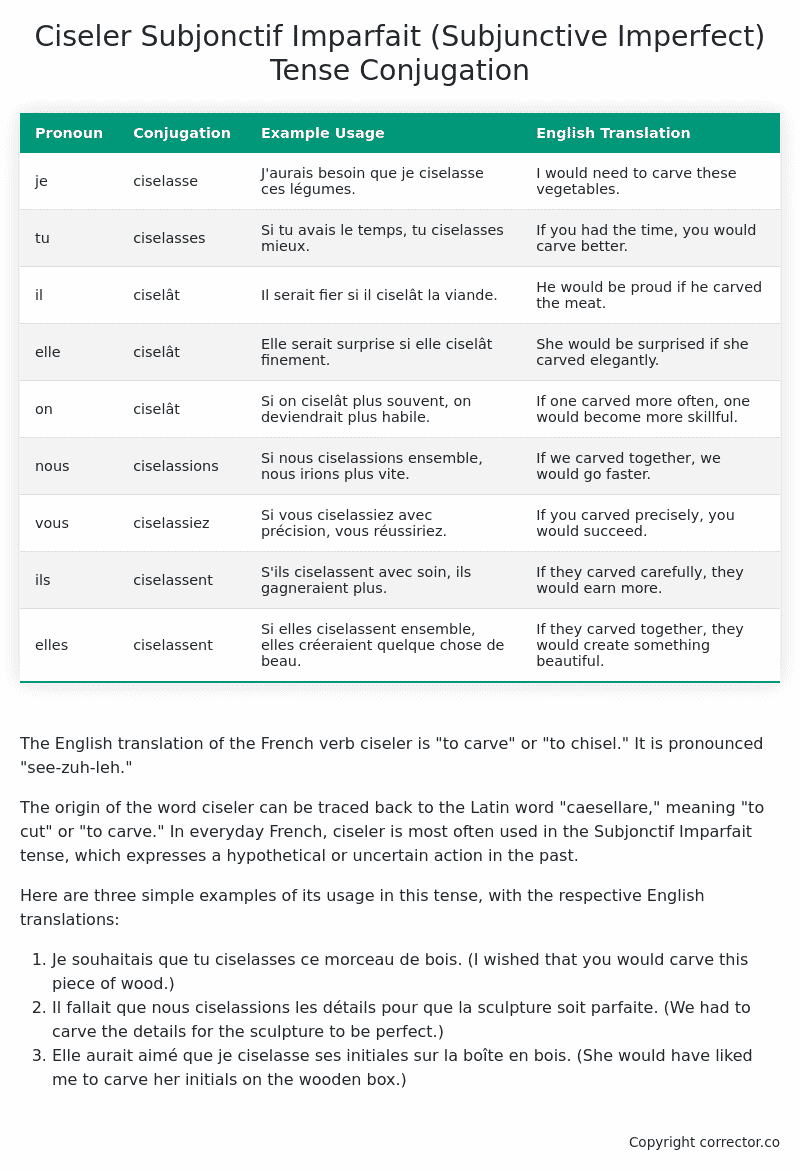Subjonctif Imparfait (Subjunctive Imperfect) Tense Conjugation of the French Verb ciseler
Introduction to the verb ciseler
The English translation of the French verb ciseler is “to carve” or “to chisel.” It is pronounced “see-zuh-leh.”
The origin of the word ciseler can be traced back to the Latin word “caesellare,” meaning “to cut” or “to carve.” In everyday French, ciseler is most often used in the Subjonctif Imparfait tense, which expresses a hypothetical or uncertain action in the past.
Here are three simple examples of its usage in this tense, with the respective English translations:
- Je souhaitais que tu ciselasses ce morceau de bois. (I wished that you would carve this piece of wood.)
- Il fallait que nous ciselassions les détails pour que la sculpture soit parfaite. (We had to carve the details for the sculpture to be perfect.)
- Elle aurait aimé que je ciselasse ses initiales sur la boîte en bois. (She would have liked me to carve her initials on the wooden box.)
Table of the Subjonctif Imparfait (Subjunctive Imperfect) Tense Conjugation of ciseler
| Pronoun | Conjugation | Example Usage | English Translation |
|---|---|---|---|
| je | ciselasse | J’aurais besoin que je ciselasse ces légumes. | I would need to carve these vegetables. |
| tu | ciselasses | Si tu avais le temps, tu ciselasses mieux. | If you had the time, you would carve better. |
| il | ciselât | Il serait fier si il ciselât la viande. | He would be proud if he carved the meat. |
| elle | ciselât | Elle serait surprise si elle ciselât finement. | She would be surprised if she carved elegantly. |
| on | ciselât | Si on ciselât plus souvent, on deviendrait plus habile. | If one carved more often, one would become more skillful. |
| nous | ciselassions | Si nous ciselassions ensemble, nous irions plus vite. | If we carved together, we would go faster. |
| vous | ciselassiez | Si vous ciselassiez avec précision, vous réussiriez. | If you carved precisely, you would succeed. |
| ils | ciselassent | S’ils ciselassent avec soin, ils gagneraient plus. | If they carved carefully, they would earn more. |
| elles | ciselassent | Si elles ciselassent ensemble, elles créeraient quelque chose de beau. | If they carved together, they would create something beautiful. |
Other Conjugations for Ciseler.
Le Present (Present Tense) Conjugation of the French Verb ciseler
Imparfait (Imperfect) Tense Conjugation of the French Verb ciseler
Passé Simple (Simple Past) Tense Conjugation of the French Verb ciseler
Passé Composé (Present Perfect) Tense Conjugation of the French Verb ciseler
Futur Simple (Simple Future) Tense Conjugation of the French Verb ciseler
Futur Proche (Near Future) Tense Conjugation of the French Verb ciseler
Plus-que-parfait (Pluperfect) Tense Conjugation of the French Verb ciseler
Passé Antérieur (Past Anterior) Tense Conjugation of the French Verb ciseler
Futur Antérieur (Future Anterior) Tense Conjugation of the French Verb ciseler
Subjonctif Présent (Subjunctive Present) Tense Conjugation of the French Verb ciseler
Subjonctif Passé (Subjunctive Past) Tense Conjugation of the French Verb ciseler
Subjonctif Imparfait (Subjunctive Imperfect) Tense Conjugation of the French Verb ciseler (this article)
Subjonctif Plus-que-parfait (Subjunctive Pluperfect) Tense Conjugation of the French Verb ciseler
Conditionnel Présent (Conditional Present) Tense Conjugation of the French Verb ciseler
Conditionnel Passé (Conditional Past) Tense Conjugation of the French Verb ciseler
L’impératif Présent (Imperative Present) Tense Conjugation of the French Verb ciseler
L’infinitif Présent (Infinitive Present) Tense Conjugation of the French Verb ciseler
Struggling with French verbs or the language in general? Why not use our free French Grammar Checker – no registration required!
Get a FREE Download Study Sheet of this Conjugation 🔥
Simply right click the image below, click “save image” and get your free reference for the ciseler Subjonctif Imparfait tense conjugation!

Ciseler – About the French Subjonctif Imparfait (Subjunctive Imperfect) Tense
Formation
Common Everyday Usage Patterns
Interactions with Other Tenses
Subjonctif Présent
Indicatif Passé Composé
Conditional
Conditional Perfect
Summary
I hope you enjoyed this article on the verb ciseler. Still in a learning mood? Check out another TOTALLY random French verb conjugation!


